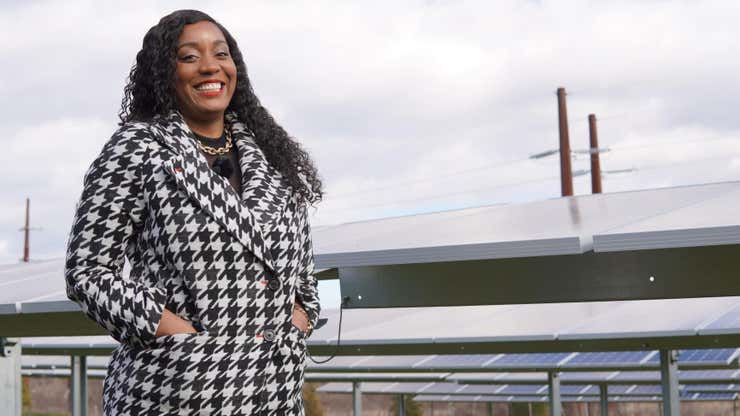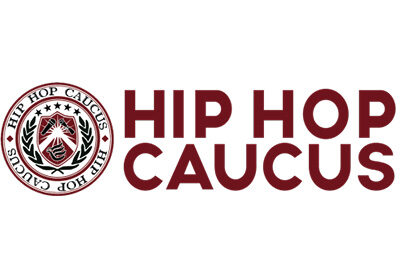Kristal Hansley Wants to Empower Black Baltimore With Solar Energy

Where I live in Baltimore, utility bills can be a crushing burden. That’s especially true for the city’s low-income residents, most of whom are Black. A 2020 study found that a quarter of low-income households here spent more than 21.7% of their 2017 income on energy, which is more than seven times higher than the median energy burden. Kristal Hansley is working to change that.
On Juneteenth last year, Hansley launched WeSolar, a firm that provides affordable solar energy to low- and middle-income households. The company is based on a community solar model, wherein people buy or rent the panels on nearby solar farms. The power those panels generate is sent back into the grid, and the customers who pay for the panels then get credits on their utility bills to lower the overall costs. WeSolar currently has three farms in Maryland and is in the process of bidding on three more.
The model helps provide solar power to those who may not otherwise have access to it. Research shows that Black and brown communities are far less likely to have access to rooftop solar power, for a variety of reasons, among them that it can require thousands of dollars in upfront costs and it requires people to own the home where the panels are being installed. The country’s long, racist history of redlining, segregation, and labor exploitation makes it more difficult for Black Americans to buy homes than their white counterparts. According to the Census Bureau, Black Americans have the lowest rate of home ownership in the U.S. of any race.
Hansley’s company aims to reduce monthly energy costs for its Baltimore customers, most of whom are Black and low-income, by at least 25%. On average, she says, the program can save users $300 per year. If you think this sounds too good to be true, you’re not alone. Hansley said she’s used to residents being boggled by her pitch.
“You sign up, it costs you nothing. And now all of a sudden you get savings and it’s green and it’s all done virtually,” she said, noting some of the people she approaches think it’s a “scam.” As such, a big part of her job is having long conversations with skeptics.
“It can be hard to explain that what you’re getting is credit back for paying for these panels that are on a solar farm that you’re not seeing because it’s miles away,” she said. “I mean, if I wasn’t who I was, I would think it was too good to be true, too.”
These discussions aren’t easy, especially since many tend to distrust those who are offering savings, but Hansley never turns down an opportunity to have them. She recalled a day last year when she was on her way to the grocery store and came across a community meeting. Even though she was wearing sweatpants, she walked right up to an older woman and began talking to her about the financial benefits of community solar. By the end of the conversation, the woman was calling up her family members to let them know to sign up for WeSolar, too.
When talking about WeSolar with potential customers, she also doesn’t shy away from helping them with other problems they may be facing with their energy bills. Whether or not they even sign up for WeSolar, Hansley doesn’t hesitate to go through people’s utility bills with them and explain what each line means. She’s even conducted her own audits of energy bills for struggling ratepayers, helping them make sure they’re not being overcharged by third-party utility suppliers.
“Many people don’t understand how their energy bills are being calculated, they just pay,” she said.
Hansley said a key part of these conversations is having patience, making sure to listen to people’s struggles instead of immediately launching into a pitch for her company. It’s that skill—knowing how to communicate with people—that Hansley said is one of her most important assets.
“It’s just about being a normal person, being a human being—like, a nice human being,” she said. “Some people really have the tech skills, and I’ve learned those, but I’ve always had the soft skills, like leadership and knowing how to talk to people and how to connect with all kinds of people…from squeegee boys and dope boys, to corporate executives who make $300 million a year, to world leaders, county executives, and governors.”
Yinka Bode-George, the environmental health manager at the National Caucus of Environmental Legislators who lives in Baltimore, said Hansley is skilled at helping Baltimoreans see the many ways they can benefit from clean energy sources. “She can connect dots between economic opportunity, community health, environmental wellness, and racial justice to create effective solar strategies for Baltimore City community members,” she said.
Hansley said another important advantage she has is her commonalities with her customer base. She grew up working class, and like over 60% of Baltimore residents, she is Black.
“Actually being someone that looks like the community helps with trust,” she said.
But in the solar industry, being Black means Hansley sticks out. The vast majority of senior solar executives are white men. In fact, Hansley said, she is the first Black woman to launch a community solar firm. The prospect of being first at something has never deterred Hansley, though. She is comfortable operating in uncharted territory. She was the first woman in her family to go to college. Before starting WeSolar, she worked for one of the first-ever companies to bring community solar online in Maryland, where her job was focused on developing the first solar farms for low- and middle-income Baltimoreans. Now, she wants to help Baltimore residents wade into the unfamiliar area of renewable power.
If Hansley’s model works, she hopes it can be expanded to other cities because Baltimore isn’t the only place where struggling Black residents could benefit from access to solar power. A 2020 study found that, when controlling for year, income, household size and location, Black renters paid an average of $273 more per year for utilities than their white counterparts between 2010 and 2017.
“Community solar provides a scalable opportunity for densely packed and designed communities to pool resources, in the context of limited space and mixed rental and homeownership,” said Tamara Toles O’Laughlin, an Baltimore-based environmental policy advocate and previous North America Director of 350.org, who first met Hansley at a community meeting in 2018. “It levels the playing field.”
Solar can play an important role in the nation’s clean energy transition—a transition that could have the greatest benefits for working class people of color, who are disproportionately harmed by climate disasters as well as dirty power sources’ pollution.
“Energy solutions like community solar projects can right-size Baltimore City’s history of environmentally unjust energy sources—such as incineration facilities—while placing Baltimore’s Black and brown leaders at the forefront of a renewable energy economy,” Bode-George said.
To truly meet the scale of the climate crisis, renewable power will have to go far beyond opt-in systems and instead take over the entire energy grid. Ultimately, Hansley hopes for a mobilization “as big as the one FDR launched after World War Two” to make that happen.
To get there, Hansley says, we’ll need tons of new infrastructure and technology. But we’ll also need people skills to make sure everyone is informed and empowered in that transition.




